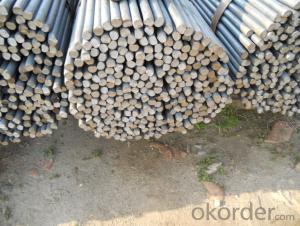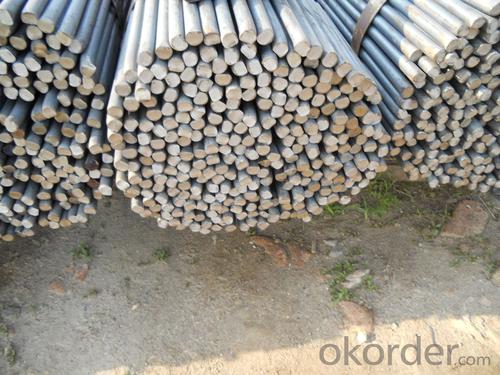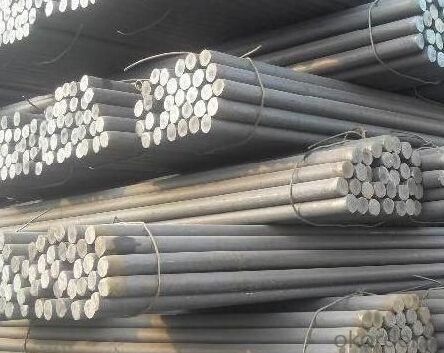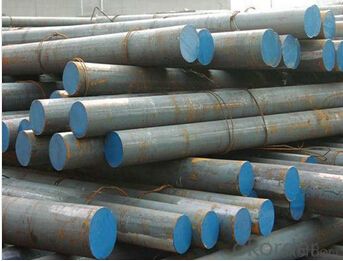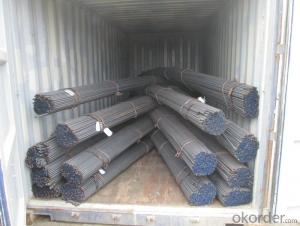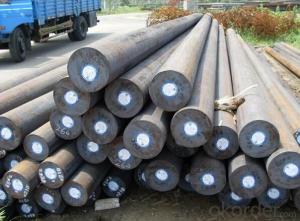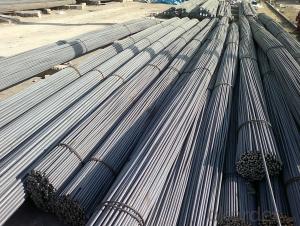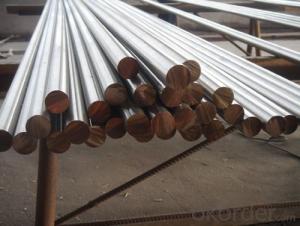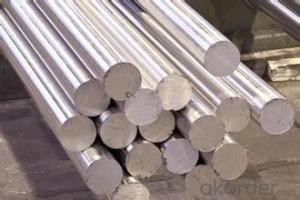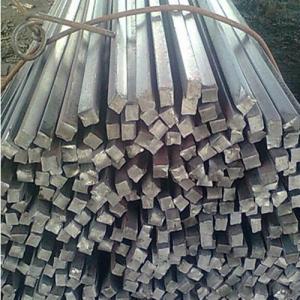Chinese Standard Round Bar of Grade: Q195, Q235, Q345
- Loading Port:
- Tianjin
- Payment Terms:
- TT OR LC
- Min Order Qty:
- 100 m.t.
- Supply Capability:
- 5000 m.t./month
OKorder Service Pledge
OKorder Financial Service
You Might Also Like
Product Description:
OKorder is offering Chinese Standard Round Bar of Grade: Q195, Q235, Q345 at great prices with worldwide shipping. Our supplier is a world-class manufacturer of steel, with our products utilized the world over. OKorder annually supplies products to European, North American and Asian markets. We provide quotations within 24 hours of receiving an inquiry and guarantee competitive prices.
Product Applications:
Chinese Standard Round Bar of Grade: Q195, Q235, Q345 are ideal for structural applications and are widely used in the construction of buildings and bridges, and the manufacturing, petrochemical, and transportation industries.
Product Advantages:
OKorder's Chinese Standard Round Bar of Grade: Q195, Q235, Q345 are durable, strong, and resist corrosion.
Main Product Features:
· Premium quality
· Prompt delivery & seaworthy packing (30 days after receiving deposit)
· Corrosion resistance
· Can be recycled and reused
· Mill test certification
· Professional Service
· Competitive pricing
Specifications of Chinese Standard Round Bar of Grade: Q195, Q235, Q345
1. Grade: Q195, Q235, Q345
2. Diameter: 6mm-150mm
3. Length: 6m, 9m, 12m or as customer’s request
4. Tolerance: Within ±5% for weight; ±2mm for diameter
5. Note: The price can be better is the quantity is good
6. Chemical composition
Alloy No | Element (%) | ||||
C | Mn | S | P | Si | |
Q195 | 0.06-0.12 | 0.25 | ≤0.05 | ≤0.045 | ≤0.3 |
Q235 | 0.12—0.20 | 0.3—0.7 | ≤0.045 | ≤0.045 | ≤0.3 |
Q345 | ≤0.2 | 1.00-1.60 | ≤0.045 | ≤0.045 | ≤0.55 |
Usage and Applications of Chinese Standard Round Bar of Grade: Q195, Q235, Q345
1. Chinese standard steel bar is often used where large amounts of steel need to be formed, for example as structural steel.
2. And we can use this kind of product on the performance of the mechanical parts if the demand is not very high.
3. Steel round bar is used in construction and a large number of architectural and engineering structures.
Packaging & Delivery of Chinese Standard Round Bar of Grade: Q195, Q235, Q345
Packaging Detail: All goods are packed in bundle with steel strips and shipped by break bulk vessel or container (depend on target market and different ports)
Delivery Detail: 45 days
Trade terms: FOB, CFR, CIF
MOQ: 25 tons per specification; we can negotiate the quantity if the specification is normal or we have stock of one specification.
Weight: The price invoicing on theoretical weight basis or actual weight basis depends on customer’s request.
Shipment: The shipment of bulk break or container is depends on customer’s request and the situation of the port of destination.
Documents given: Full set of original clean on board bill of lading; Original signed commercial invoice; Original packing list; Policy of insurance; Certificate of origin and what the target market needs.
Production Flow of Chinese Standard Round Bar of Grade: Q195, Q235, Q345
1. The common processes are preheated forging quenching, dual refinement solution process, cooling quenching and isothermal quenching. We use heat treatment for dual refinement solution process.
2. Material prepare (billet) — heat up — rough rolling — precision rolling — cooling — packing — storage and transportation
Characteristics of Chinese Standard Round Bar of Grade: Q195, Q235, Q345
1. The steel in which the main interstitial alloying constituent is carbon in the range of 0.12–2.0%.
2. As the carbon percentage content rises, steel has the ability to become harder and stronger through heat treating; however it becomes less ductile.
3. Quality should be in conformity with the specification of the manufacturer. Quantity and packing conditions should be in conformity with the term in the contract.
4. Regardless of the heat treatment, higher carbon content reduces weld ability. In carbon steels, the higher carbon content lowers the melting point.
FAQ:
Q1: Why buy Materials & Equipment from OKorder.com?
A1: All products offered byOKorder.com are carefully selected from China's most reliable manufacturing enterprises. Through its ISO certifications, OKorder.com adheres to the highest standards and a commitment to supply chain safety and customer satisfaction.
Q2: How do we guarantee the quality of our products?
A2: We have established an advanced quality management system which conducts strict quality tests at every step, from raw materials to the final product. At the same time, we provide extensive follow-up service assurances as required.
Q3: How soon can we receive the product after purchase?
A3: Within three days of placing an order, we will begin production. The specific shipping date is dependent upon international and government factors, but is typically 7 to 10 workdays.
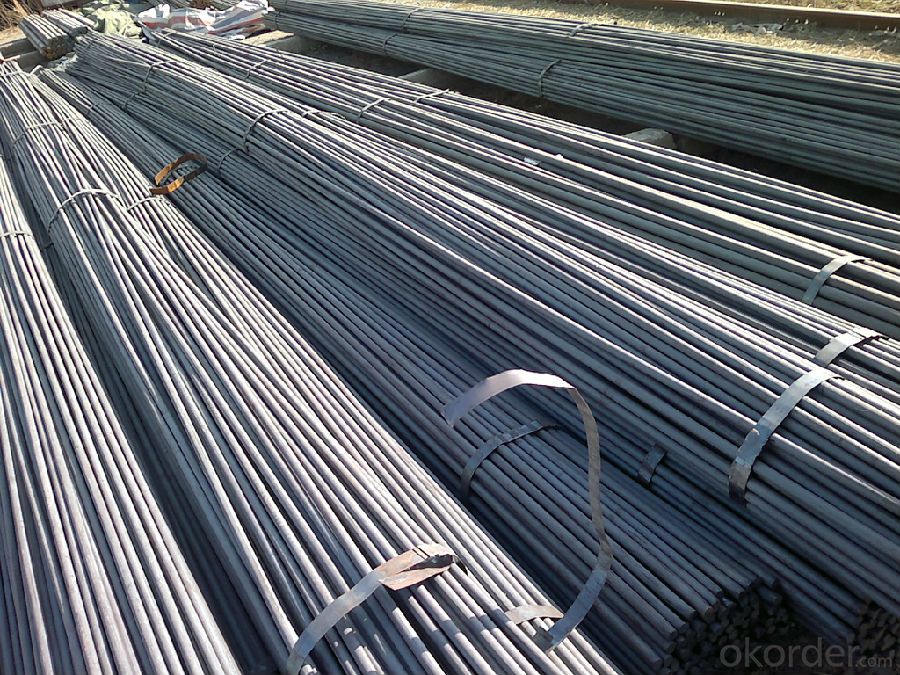
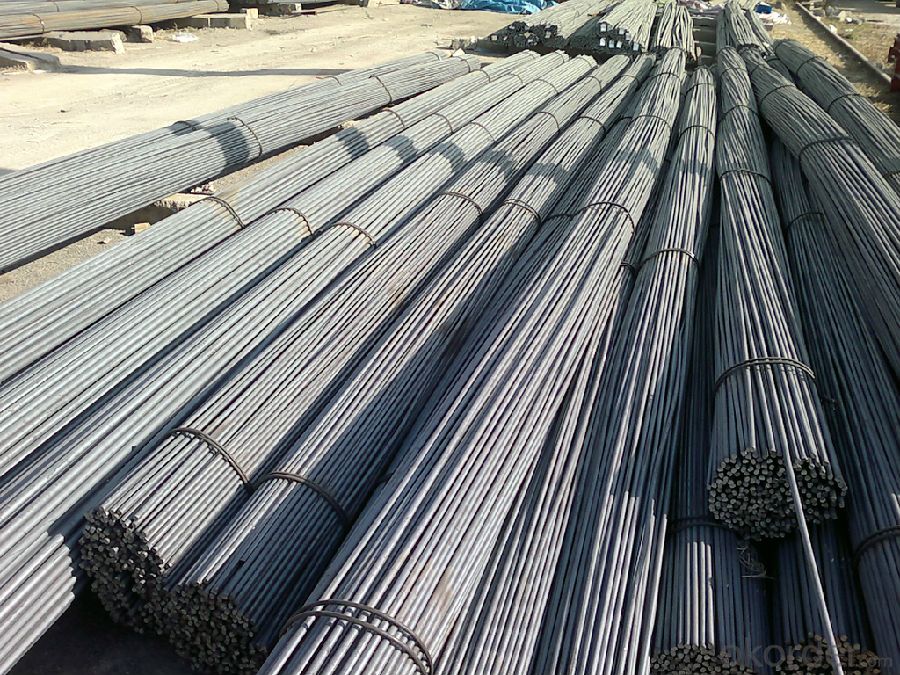
- Q: What are the advantages of using nickel-titanium alloy steel round bars?
- There are several advantages of using nickel-titanium alloy steel round bars. Firstly, this alloy offers high strength and excellent corrosion resistance, making it suitable for various applications in industries such as aerospace, automotive, and medical. Additionally, nickel-titanium alloy steel has shape memory properties, allowing it to return to its original shape after deformation, making it ideal for applications requiring repeated bending or twisting. Furthermore, this alloy exhibits superelasticity, meaning it can withstand large amounts of strain without permanent deformation, providing enhanced durability and longevity. Overall, the unique combination of strength, corrosion resistance, shape memory, and superelasticity makes nickel-titanium alloy steel round bars a versatile and advantageous material choice.
- Q: What are the advantages of using zinc-alloy steel round bars?
- One of the advantages of using zinc-alloy steel round bars is their high corrosion resistance. The zinc coating acts as a protective barrier, preventing rust and corrosion, which makes these bars suitable for outdoor applications and environments with high humidity. Additionally, zinc-alloy steel round bars have excellent strength and durability, making them ideal for structural and load-bearing purposes. Furthermore, the zinc coating provides enhanced aesthetics, offering a polished and visually appealing finish. Overall, the advantages of using zinc-alloy steel round bars include corrosion resistance, strength, durability, and improved appearance.
- Q: Can steel round bars be used for making power transmission systems?
- Yes, steel round bars can be used for making power transmission systems. Steel round bars possess high strength and durability, making them suitable for transmitting power in various applications such as gears, shafts, and couplings.
- Q: What are the advantages of using nickel-chromium-aluminum alloy steel round bars?
- Nickel-chromium-aluminum alloy steel round bars offer numerous benefits. Firstly, they possess exceptional corrosion resistance, making them ideal for use in harsh environments or industries where corrosion is a concern. This resistance to corrosion prolongs the lifespan of the round bars, reducing maintenance and replacement expenses. Secondly, these round bars are known for their high strength and durability, making them suitable for applications that involve heavy loads or high temperatures. Their strength also enhances structural stability, making them a dependable option for construction projects and industrial applications. Additionally, this alloy steel demonstrates excellent thermal stability, allowing it to maintain its shape and mechanical properties even under elevated temperatures. This attribute is particularly advantageous in industries such as aerospace, automotive, and power generation, where high temperatures are prevalent. Furthermore, nickel-chromium-aluminum alloy steel round bars offer good formability and machinability, facilitating easy fabrication and customization. This versatility allows for the production of intricate shapes and designs, making them adaptable for various manufacturing processes. Lastly, this alloy steel is recognized for its resistance to oxidation and scaling at high temperatures. This makes it suitable for applications involving exposure to extreme heat or rapid temperature changes, such as in furnaces or heat exchangers. In conclusion, the benefits of utilizing nickel-chromium-aluminum alloy steel round bars include exceptional corrosion resistance, high strength and durability, thermal stability, formability, and resistance to oxidation. These qualities make it a preferred choice for a wide range of industries, ensuring reliable performance and longevity in various applications.
- Q: How do steel round bars compare to plastic or composite bars?
- Steel round bars are generally considered to be stronger and more durable compared to plastic or composite bars. They have higher tensile strength, can withstand heavier loads, and are less prone to bending or breaking. Additionally, steel bars offer better resistance to harsh weather conditions, corrosion, and fire. However, plastic or composite bars can be more lightweight and cost-effective, making them suitable for certain applications where weight or budget is a concern. Overall, the choice between steel, plastic, or composite bars depends on the specific requirements of the project or application.
- Q: How are steel round bars tested for quality?
- To ensure that steel round bars meet the necessary standards and specifications, various methods are employed to test their quality. One commonly used test is visual inspection, which involves carefully examining the bars for any visible defects such as surface cracks, pits, or deformities. This task is carried out by highly skilled personnel who have been trained to identify irregularities that could potentially impact the quality of the steel bars. Another crucial test is dimensional inspection, which assesses the diameter, length, and straightness of the round bars. This ensures that the bars fall within the specified tolerances and meet the required dimensions for their intended use. Mechanical testing is also conducted to evaluate the strength and mechanical properties of the steel bars. This includes tests like tensile strength, yield strength, and elongation, which determine how the bars will perform under different loads and conditions. Specialized equipment is used to carry out these tests, providing important information about the structural integrity and quality of the steel bars. Moreover, chemical composition analysis is performed to verify that the steel bars have the correct proportions of various elements, such as carbon, manganese, and alloying elements. This analysis is crucial as it determines the suitability of the bars for specific applications and ensures that they possess the desired characteristics. Additionally, non-destructive testing methods, such as ultrasonic testing, magnetic particle inspection, or dye penetrant testing, may also be employed. These techniques can detect internal or surface defects that may not be visible to the naked eye, providing further confidence in the quality and integrity of the steel bars. In summary, a combination of visual inspection, dimensional inspection, mechanical testing, chemical composition analysis, and non-destructive testing methods is used to thoroughly assess the quality of steel round bars. These rigorous testing processes are essential in ensuring that the bars meet the required standards and specifications, guaranteeing customers high-quality and reliable steel products.
- Q: What are the different types of steel round bar coatings used in the automotive industry?
- There are several different types of steel round bar coatings that are commonly used in the automotive industry. These coatings are applied to the steel bars to enhance their durability, corrosion resistance, and overall performance. 1. Galvanized Coating: This is one of the most widely used coatings for steel round bars in the automotive industry. Galvanized coating involves applying a layer of zinc to the surface of the steel bar. This coating provides excellent corrosion resistance, protecting the steel from rust and other forms of degradation. 2. Epoxy Coating: Epoxy coatings are often used in automotive applications that require high chemical resistance. This type of coating provides a protective barrier against chemicals, moisture, and other corrosive substances. Epoxy coatings also have excellent adhesion properties, ensuring long-lasting performance. 3. Powder Coating: Powder coating is a popular choice for steel round bars in the automotive industry due to its durability and aesthetic appeal. This coating involves applying a dry powder to the surface of the steel bar, which is then heated to create a tough, protective layer. Powder coatings come in a wide range of colors and finishes, allowing for customization and branding opportunities. 4. Ceramic Coating: Ceramic coatings offer exceptional heat resistance, making them ideal for automotive applications that involve high temperatures. This type of coating provides a protective barrier that prevents heat damage and improves the overall lifespan of the steel round bars. 5. Phosphate Coating: Phosphate coatings are often used as a pre-treatment before applying other types of coatings. This coating improves the adhesion of subsequent coatings and provides additional corrosion resistance. Phosphate coatings also enhance the lubricity of the steel bar, reducing friction and wear. These are just a few examples of the different types of steel round bar coatings used in the automotive industry. Each coating offers unique benefits and is chosen based on the specific requirements of the application. Overall, these coatings play a crucial role in improving the performance and longevity of steel round bars in automotive applications.
- Q: What are the different surface treatments available for tool steel round bars?
- There are several surface treatments available for tool steel round bars, which are used to enhance the performance, durability, and overall quality of the steel. Some of the common surface treatments for tool steel round bars include: 1. Nitriding: This process involves exposing the tool steel to a nitrogen-rich environment at high temperatures. It forms a hard surface layer that improves wear resistance and reduces friction. 2. Coating: Tool steel round bars can be coated with various materials such as titanium nitride (TiN), titanium carbonitride (TiCN), or chromium nitride (CrN). These coatings provide excellent resistance to wear, corrosion, and heat. 3. Black oxide: It is a chemical treatment that forms a black oxide layer on the surface of the tool steel. This treatment improves corrosion resistance and reduces the risk of rusting. 4. Heat treatment: Tool steel round bars can undergo heat treatment processes such as annealing, tempering, or quenching. These treatments help to improve the hardness, strength, and toughness of the steel. 5. Surface grinding: This process involves removing a thin layer of material from the surface of the tool steel. It helps to achieve a smooth and polished surface, enhancing the aesthetics and reducing the risk of surface defects. 6. Shot peening: It is a process where small metal or ceramic particles are propelled onto the surface of the tool steel at high velocity. This treatment induces compressive stress, improving the fatigue resistance and extending the lifespan of the steel. 7. Electropolishing: This treatment involves immersing the tool steel in an electrolyte bath and applying an electric current. It helps to remove surface imperfections, enhance the surface finish, and improve corrosion resistance. These surface treatments can be chosen based on the specific requirements and applications of the tool steel round bars. Each treatment offers unique benefits and can significantly enhance the performance and longevity of the tool steel.
- Q: What is the tolerance for diameter in steel round bars?
- The tolerance for diameter in steel round bars can vary depending on the specific application and industry standards. However, in general, the tolerance for diameter in steel round bars typically ranges from +/- 0.005 inches to +/- 0.010 inches.
- Q: What is the difference between strip steel and round steel? Where are they mainly used?
- Round steel is a solid strip of steel whose cross section is round. The specifications are expressed in millimeters of diameter, such as "50", which means a round bar of 50 millimeters in diameter. Round bar is divided into three parts: hot rolling, forging and cold drawing. Standard Specification for hot rolled round steel is 5.5-250 mm. Of which: 5.5-25 mm small round bars are mostly supplied by straight strips. They are used as reinforcing bars, bolts and various mechanical parts. Round bars larger than 25 millimeters are used mainly for making mechanical parts or for seamless steel tubes.Mainly used in the manufacture of various tools, cutting tools, moulds and tools (see tool steel), but also a large number of used in the manufacture of various mechanical parts.
Send your message to us
Chinese Standard Round Bar of Grade: Q195, Q235, Q345
- Loading Port:
- Tianjin
- Payment Terms:
- TT OR LC
- Min Order Qty:
- 100 m.t.
- Supply Capability:
- 5000 m.t./month
OKorder Service Pledge
OKorder Financial Service
Similar products
Hot products
Hot Searches
